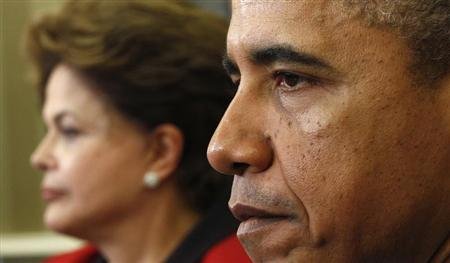CSMS Magazine
I’m sure, my friends, you remember my article on the G-20 Summit held in St. Petersburg, Russia earlier this month. It was satiric, but also factual. I then explained how president Obama was alone in his quest to lunch air strikes on Syria. I also made reference to Brazilian president Dilma Rousseff, who was reportedly to be quite upset with the Obama administration for spying on her presidency as well as her private life. The Brazilian delegation was said to shun Barack Obama at the summit.
Well, last week, the disapproval went public when president Rousseff canceled her official state’s visit to Washington. It was a major blow to Obama’s foreign diplomacy. The blow was even more substantial as it came during an administration the whole world thought was going to be very different in its relations with other nations.
Today at the UN general assembly, the rift between the two nations got wider as President Dilma Rousseff launched a blistering assault on The United States, calling the US surveillance program “a breach to international law.”All this was happening as Barack Obama waited in the wing to deliver his own speech. An angry Rousseff declared:
“Tampering in such a manner in the affairs of other countries is a breach of international law and is an affront of the principles that must guide the relations among them, especially among friendly nations. A sovereign nation can never establish itself to the detriment of another sovereign nation. The right to safety of citizens of one country can never be guaranteed by violating fundamental human rights of citizens of another country.”
The policy of eavesdropping and belittling Latin American leaders no longer holds in a region where most of its leaders want to pursuit a fervent nationalistic course, away from US influence and its predatory policies of the old days.
Two months ago, Bolivian president Evo Morales’s airplane was forced to land in Austria as he was returning home from a state visit to Russia. The reason given was that it was falsely believed that NSA fugitive Edward Snowden was secretly traveling with him.
This has infuriated regional leaders, and isolated those who were still ambivalent in their rapport with Washington. “It’s hard to imagine the US intelligence service did not know that Snowden was not onboard,” asserted Eduardo Galeano, Uruguayan distinguished scholar.
The drop that overflew the vase
 The Brazilian case was the most appalling to Latin American leaders, and they want to send a message to Washington, let it be known that the days of the caudillos are no more.
The Brazilian case was the most appalling to Latin American leaders, and they want to send a message to Washington, let it be known that the days of the caudillos are no more.
In the aftermath of these revelations, the Brazilian government ordered an investigation into telecommunications companies to determine whether they illegally shared data with the NSA.
Soon, Brazil takes the lead to strengthen South America’s regional defense and prestige. Consequently, defense ministers of Brazil and Argentina signed a broader military cooperation agreement on September 13. The two governments will work together to improve cyber defense capabilities. Beginning in 2014, Brazil will be providing cyber warfare training to Argentine officers. Some experts believe that Brazil, along with other countries, should use the NSA leaks scandal as an opportunity to take a stand on internet governance.
“The fact is the government wants to offer Brazilian internet users a stronger protection for their privacy. It is a great opportunity, not only for Brazil, but for many countries to really take a stand on internet governance and really try to understand how the future of the internet and communications as a whole will end up coming out of this huge scandal about the NSA leaks,” director of the Institute of Technology and Society, Carlos Affonso Souza, told German television RT.
Brazil is asserting itself on the world stage. It now has the largest economy in Latin America. It is an influential member of the BRICS nations. It is governed by social democrats with a history of opposing US foreign policy in Latin America and in the Caribbean. Although the country has long given up its ambitions to build a nuclear arsenal, no one doubts Brazil’s ability to enter the nuclear club, should it decide to do so.
Once again, Obama has miscalculated its foreign policy initiative with regards to Latin America. Historically, the United States foreign policies vis-à-vis this part of the world was to create client regimes backed by the men of the iron gloves—the military—in order to protect the most repulsive reactionary layers of society, completely beholden to the bourgeois way of life in North America. Things have changed, and the US has to adjust.
Dr. Ardain Isma is editor-in-chief of CSMS Magazine. He teaches Cross-Cultural Studies at the University of North Florida (UNF). He is a scholar as well as a novelist. He may be reached at:publisher@csmsmagazine.org


